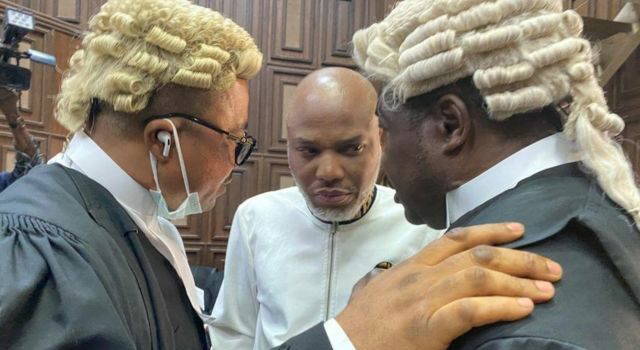
The Indigenous People of Biafra (IPOB) has strongly condemned the resumption of its leader Nnamdi Kanu’s trial today at the Federal High Court in Abuja, describing the proceedings as “a gross violation of Nigeria’s constitution and international law.”
In a statement by spokesperson Emma Powerful, the separatist group alleged the Nigerian government continues to disregard multiple court rulings, including an October 2022 Appeal Court judgment that discharged Kanu and a July 2021 ECOWAS Court ruling concerning his rights.
“The Nigerian government’s pursuit of this trial constitutes judicial terrorism,” Powerful stated. “Mazi Nnamdi Kanu’s extraordinary rendition from Kenya in 2021 was an act of kidnapping that violated international treaties. His continued detention despite court orders shows blatant disregard for the rule of law.”
The group highlighted several legal concerns:
- Alleged denial of consular assistance during Kanu’s controversial repatriation
- Claims of inhumane treatment in detention
- Violation of the Terrorism Prevention and Prohibition Act 2022 provisions
IPOB reminded Kanu’s newly appointed senior advocates of their “ethical duty to reject this unlawful process,” warning that participating in the trial would lend legitimacy to what they called a “void ab initio” proceeding.
The statement referenced Kanu’s past escape from Nigeria following what IPOB described as an assassination attempt, arguing: “No law anywhere sanctions punishing someone for fleeing mortal danger. This trial rewards lawlessness and emboldens tyranny.”
Calling for international intervention, IPOB urged the UN, African Union, European Union and global human rights organizations to stop what it termed “this judicial travesty.” The group appealed to “all lovers of freedom worldwide” to demand Kanu’s unconditional release.
Today’s court session comes nearly three years after Kanu’s controversial arrest and extradition from Kenya, which sparked nationwide protests and international condemnation. Legal experts continue debating the constitutional implications of trying a defendant allegedly obtained through extraordinary rendition.






